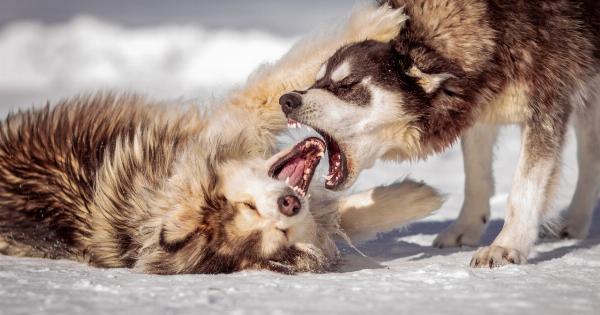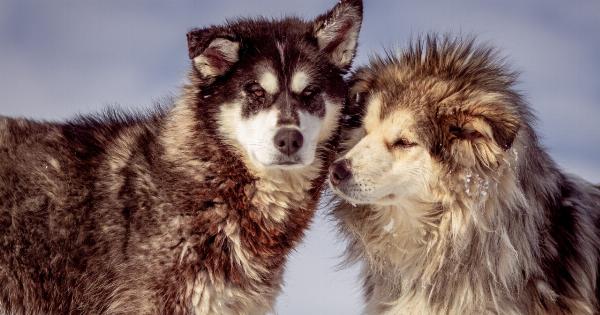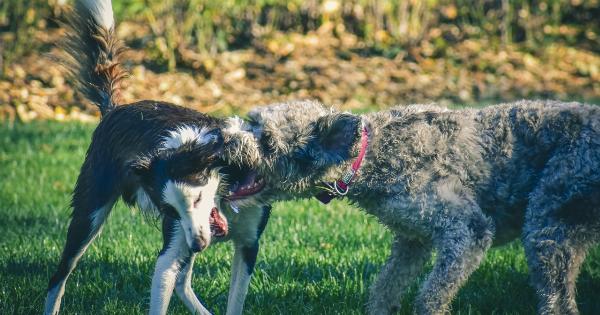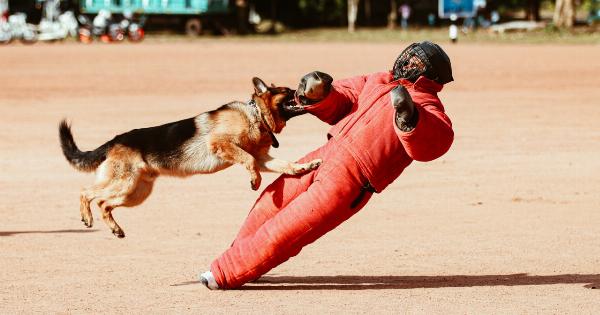Dogs are usually friendly and docile animals that many of us have grown to love and adore. They have been domesticated for thousands of years, and have been some of the most loyal companions known to man.
However, there are instances when our beloved furry friends may display sudden, unprovoked aggression. This type of behavior can be quite shocking, especially for pet owners who have never encountered it before.
Types of Aggression in Dogs
Aggression in dogs can come in many forms and can be caused by various factors. Below are some of the most common types of aggression in dogs:.
1. Fear Aggression
Fear aggression happens when a dog feels threatened or insecure. This type of aggression can be triggered by various factors, such as loud noises, unfamiliar places, people, or animals.
2. Dominance Aggression
Dominance aggression happens when a dog perceives itself as the alpha in a situation.
This type of aggression can manifest when a dog feels its territory, food, or any other resources are in jeopardy, and it perceives any challenges to its authority as an act of disrespect.
3. Territorial Aggression
As the name suggests, territorial aggression is when a dog perceives itself as the protector of its living space, and will exhibit aggressive behavior towards anyone or anything that it perceives as a threat to that space.
4. Protective Aggression
Protective aggression is similar to territorial aggression, but usually manifests when a dog’s owner or any member of its family is threatened or in danger.
Factors That May Trigger Aggression in Dogs
Aside from the different types of aggression, various factors can trigger aggressive behavior in dogs. Below are some of the most common:.
1. Genetics
Some breeds of dogs are more predisposed to certain types of aggression than others. This is often attributed to genetics and breeding practices.
2. Fear
As mentioned earlier, fear can be a significant factor in causing aggression in dogs. When a dog is frightened, its first instinct is to fight or flee.
3. Lack of Socialization
Dogs that lack proper socialization tend to be more fearful and anxious than their properly socialized counterparts. This can lead to aggression when they are exposed to unfamiliar people, animals, or environments.
4. Resource Guarding
Dogs that have a history of being possessive of food, toys, or any other items they consider valuable tend to be more prone to aggressive behavior when they feel threatened.
5. Pain or Illness
Dogs that are in pain or suffering from an illness may exhibit sudden aggression as a result of the discomfort they are feeling.
6. Previous Trauma
Dogs that have been subjected to previous trauma or abuse may be more prone to sudden outbursts of aggression, especially when they are exposed to triggers that remind them of their past experiences.
Who or What is Responsible for a Dog’s Sudden Aggression?
When a dog exhibits sudden aggression, it is usually challenging to pinpoint a specific cause. More often than not, there are multiple factors that come into play, and they can vary from one dog to another.
Below are some of the possible culprits behind a dog’s sudden aggression:.
1. Lack of Training or Socialization
Dogs that have not been adequately trained or socialized tend to be more fearful and anxious, which can trigger aggressive behavior in unfamiliar situations. Proper training and socialization can help mitigate these issues significantly.
2. Medical Conditions
Sometimes, sudden aggression in dogs can be a result of an underlying medical condition, such as pain, illness, or neurological disorders. In such cases, it is advisable to consult a veterinarian to rule out any potential health issues.
3. Previous Trauma or Abuse
As previously mentioned, dogs that have been subjected to previous trauma or abuse can exhibit sudden outbursts of aggression.
It is essential to work with a professional dog trainer or behaviorist to help desensitize the dog to any triggers that may be causing aggression.
4. Environmental Factors
Environmental factors such as noise, unfamiliar people or animals, and situations that may cause fear or anxiety can trigger aggressive behavior in dogs.
It is essential to identify these factors and remove them if possible or use desensitization techniques to help the dog overcome them.
5. Genetics
Some dog breeds are more predisposed to certain types of aggression due to genetics and breeding practices. However, this does not mean that all dogs of that particular breed will exhibit aggression.
Proper training and socialization can help mitigate any potential aggression.
Conclusion
Identifying the cause of sudden aggression in dogs can be quite challenging. However, it is essential to work with a professional dog trainer, behaviorist, or veterinarian to pinpoint the cause and develop a treatment plan.
Additionally, dog owners should ensure their dogs have proper training and socialization, regular exercise, and a safe living environment to help prevent sudden outbursts of aggression.






















